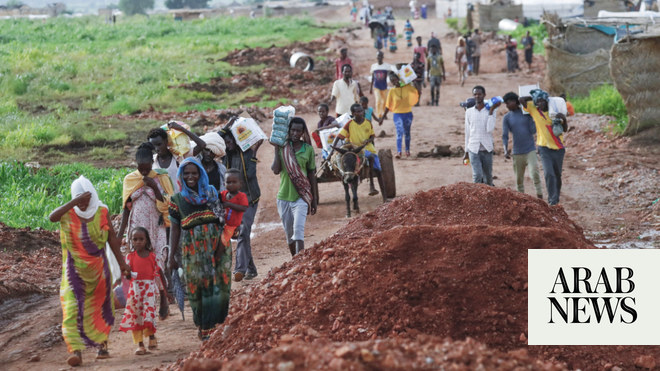
They first reached the city of Wad Madani 200 km south of the capital, where witnesses say life continues relatively normally
GALLABAT, Sudan: An interminable row of minibuses lines the road that separates Sudan’s southeastern city of Gedaref from the Ethiopian border, slowly bringing people fleeing Sudan’s war closer to safety.
There, families have been “sleeping on the ground out in the open,” said Oktay Oglu, a Turkish engineer who worked at a factory in the capital Khartoum before escaping with his family. Locals and foreigners alike have made this journey, fleeing more than two weeks of brutal fighting that pits forces loyal to rival generals against one other, with civilians caught in the crossfire.
The minibuses move at a snail’s pace. At the end of the road to the border, Sudanese and Ethiopian flags flutter in the sky, a mere 10 meters between them.
But there, another long wait lies in store.
With his wife and three children, Oglu made the arduous trip from Khartoum to Gedaref after waiting days until a relative lull in fighting allowed them to escape.
They first reached the city of Wad Madani 200 km south of the capital, where witnesses say life continues relatively normally. They spent the night there before continuing on to Gedaref another 250 km east.
Finally, the road led them to the border with Ethiopia and the small community of Gallabat, with its bare-bones homes made out of wood and dried grass.
Having arrived at the crossing after it closed at 5 p.m, they had to wait out the night until it reopened at 8 a.m. the next morning.
At the crossing they found nationals from all over the world gathered, all hoping to make it to the other side in as little time as possible.
An official at the crossing said about “9,000 people crossed the border, the majority foreigners, including many Turkish.”
Data from the UN’s International Organization for Migration said about 3,500 people of 35 different nationalities had found refuge in Ethiopia as of Tuesday.
More than 40 percent of those are Turkish, while 14 percent are Ethiopians who lived in Sudan and are returning home.












